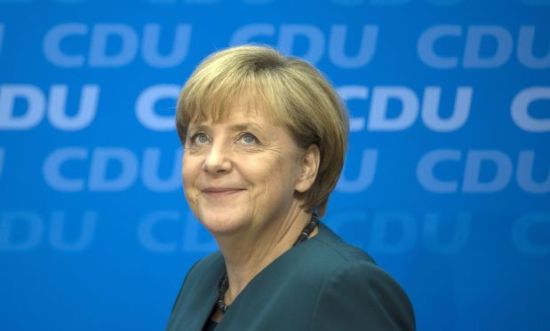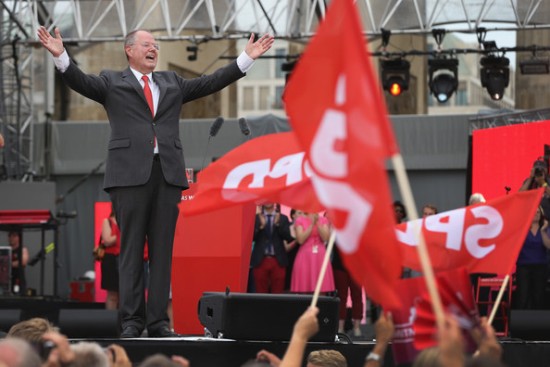25/11/2013 | Writer: Nora Leggemann
Last month, the German voters have elected the 18th Bundestag (Federal Parliament) of the Federal Republic of Germany.

Last month, the German voters have elected the 18th Bundestag (Federal Parliament) of the Federal Republic of Germany. Four parties could make it into the parliament: The CDU/CSU with 41,5% (311 seats), the SPD with 25,7% (193 seats), Die Linke with 8,6% (64 seats) and Die Grünen with 8,4% (63 seats). At the moment, the CDU/CSU – as the clear winner of the elections – negotiates about a coalition with different parties. It currently seems to be certain that Germany will soon be ruled by a Grand Coalition of CDU/CSU and SPD.
The time before and after the elections is the time when the different parties present their standpoints and goals to the public. In various party platforms and in the negotiations itself, LGBTI (lesbian, gay, bisexual, trans, intersex) rights play a role, too.
LGBTI rights in Germany
Although the past decades brought more and more rights for LGBTI people, LGBTI people in Germany still face various forms of discrimination, socially as well as structurally and legally. Especially intersexual and transgender people are still stigmatized, pathologized and disadvantaged in various ways.
Same-sex couples in Germany are still not allowed to marry like heterosexual couples. Instead, same-sex couples in Germany can conclude a so-called „registered life partnership“, which is also legally acknowledged, but - concerning taxes and the adoption of children - does not yet give all the rights and advantages that heterosexual marriage enjoys.
In the past years the implementation of LGBTI rights was mostly not voluntarily undertaken by the federal government or parliament. Instead, most of the legally codified rights of LGBTI people can be traced back to rulings of the Federal Constitutional Court of Germany. In various cases, the constitutional judges declared that existing laws and policies causing disadvantages and discrimination of LGBTIs do not accord with the German Constitution, especially with its fundamental rights. In most of these cases, the recommendations of the Court led to changes in existing codified law through a legislative process, but in some cases the CDU still rejects to accept the instructed amendments.
What do the different parties stand for?
In order to understand the position of LGBTI rights and issues in Germany, and to see what is being discussed and how, it is very illuminative to look at the current party platforms of different parties. In order not to go beyond the scope of this article, only the four parties that are now part of the German Parliament will be discussed here. Nevertheless, there are many more parties in Germany which play an interesting role and represent the different standpoints and values of the German society.
CDU
The „Christian Democratic Union“, as it is today, was founded shortly after the Second World War and is – together with the SPD - one of Germany’s biggest two parties. The head of the CDU, Angela Merkel, has been the Federal Chancellor since 2005.

The CDU represents conservative values concerning social issues and a rather neo-liberal capitalist standpoint concerning economic matters. This means, that the CDU focuses very much on the wellbeing of the German economy and tries to preserve traditional (Christian) values. The CDU’s family policy, for example, supports a comparatively conservative model of family, marriage, gender roles and child care. Though a federal lesbian and gay association in the CDU exists, the CDU still refuses to give same-sex couples the same rights that heterosexual couples have. In order to prevent a feared decay of conservative and Christian family, marriage models and values and with the explanation that children need to be raised by a father and a mother, the CDU does not want to open „normal“ marriage for gay people.
The concerns and requests of intersexual and transgender people are not mentioned in the CDU’s party platform.
SPD
The „Social Democratic Party of Germany“ is the oldest and together with the CDU the biggest Party in Germany. Based on a left-democratic standpoint, the SPD especially focuses on social issues concerning every topic, trying to establish more social justice. But lately, especially after having conducted a neo-liberally infused reform of the German welfare-state, the SPD has been criticized a lot for losing its specific social standpoint and for moving more and more towards the political center. Nevertheless, the SPD still represents rather progressive values, wants to fight discrimination and to establish equal participation and equal chances in society for everybody, irrespective of gender, age, race, class, sexual orientation, ability etc.

In this sense, the SPD wants equal rights for LGBTI people and to open marriage with all its rights for same-sex couples. The SPD’s party platform also mentions the mistreatment of transgender and intersexual people, promising to stand up for their self-determination and right to physical integrity, too.
Die Linke
The Party „The Left“ was founded in 2007 by the fusion of mainly two leftish parties. It aims to overcome capitalism and to establish a ’democratic socialism’. The question of social justice and equality is the main focus of the party. In this sense, topics such as racism, sexism, patriarchy, nationalism and other discriminating systems and practices are important for Die Linke. In the current party platform, gender issues play a great role, as well. In this sense, Die Linke names all kinds of discrimination of women and LGBTIs clearly and promises to fight for equal rights for everybody. Marriage for gay couples are an important part of their demands. Beyond this, the party demands the abolition of every kind of discrimination of trans and inter individuals and pleads for a freedom of choice concerning their „legal“ sex and gender identity.
Bündnis 90/Die Grünen
„The Greens“ (the green party) was founded between 1980 and 1993 by the fusion of different ecological and pacifist activist groups from West and East Germany. One of their main focuses was and is the protection of the environment/nature, together with issues of civil and human rights, peace and social justice.

Die Grünen want to abolish all kinds of discrimination of LGBTI individuals, socially and legally. They want marriage for gay couples, a new, non-discriminating law for transgender and for intersexual people a freedom of choice concerning their sex and gender. Die Grünen emphasizes that they want to support the equality of all different kinds of (gender) identity and sexual orientations in all parts of society.
In the party platforms both of „Die Linke“ and „Die Grünen“, LGBTI issues play an important role and these two parties clearly advocate LGBTI rights the most. The SPD mentions, that they want to advocate the rights of transgender and intersex people, but does not go more into detail about it. Nevertheless, all three parties want to open marriage for gay couples and give same-sex couples all the rights that heterosexual couples have, including the full right to adopt children.
It is only the CDU that cannot bring itself to stand up for equal rights for LGBTI people. Unfortunately, it is the CDU that won the elections again and provides the Federal Chancellor – this might, for the following years, be a serious obstacle for the implementation of equal rights for LGBTI people. But since time goes on and society changes, even the CDU might find out one day that equal rights for LGBTI people will not endanger the well-being of the German society. And even if the CDU holds on to conservative and discriminating values, we can hope that the other parties or at least the Federal Constitutional Court of Germany will do the work and force the CDU to accept the overdue implementation of equal rights for everybody.
Tags: life

